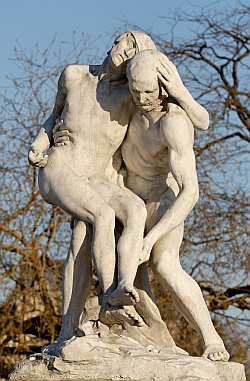Spent most of the week “riding the chair” as I like to say. Misunderstood a timetable point on a project I was working on, so I had to kick it into overdrive. Cerulean Sanctum went on the backburner. Apologies if I felt a bit distant and uninvolved this week.
Here’s what I’ve been thinking:
- I hated Blue Like Jazz and didn’t even bother to finish it—something I never do, even with the worst books—but I thought Don Miller’s prayer at the Democratic National Convention was worthy in light of the venue. Yes, it did have a liberal feel to it and, yes, he did absolve others from believing in Jesus by using himself as a proxy for their belief in his comments at the end, and, yes, he could have been more of a burning witness for Christ, but he did one thing that I admired: He touched on all the social aspects of the Gospel that never get one hint of mention during a typical prayer at a GOP/Evangelical-dominated event. We can say what we will about how we live out the Gospel, but Miller’s prayer highlights one very sad truth about American Christians: Each of us has a half-empty cup when it comes to understanding what it means to live out the full Gospel of Jesus Christ on a practical, daily basis.
- As for Obama, for someone who keeps talking about change and pushing past old paradigms, he could not have chosen a bigger old paradigm ball-and-chain than Joe “Tony Blair Said It and So Will I” Biden. I mean, seriously. Talk about “old boy networks” and “this is my time” privilege! Joe Biden? Some DNC bigwigs took Obama into a back room and said, “If you have any party loyalty at all, you WILL be choosing the biggest character we owe now that Ted Kennedy’s out of the picture.” Seriously. That conversation happened. I’ll bet good money on it.
- This just in: John McCain shows he’s got the mojo Obama lacks in picking veeps: It’s Sarah Palin, governor of Alaska, and a darned good choice, too. She’s the closest thing to Iron Lady Margaret Thatcher that we’ve seen in American politics since Elizabeth Dole ( whom I thought was a more viable presidential candidate than her husband, Bob).
- The more I think about it, the more I realize that one of the most important and influential figures of the 20th century was not a politician, but an explorer, filmmaker, inventor, scientist, firebrand, and intellect: Jacques-Yves Cousteau. He’s one of the most underestimated and overlooked figure of our day. To say he’s the greatest person to come out of 20th century France takes no effort. His global influence even after his death is extraordinary. Do the research and you’ll see what I mean.
- Doesn’t it bother you that we have to go back more than fifty years to begin to find great Americans that commanded the world’s stage? I think nothing speaks louder about the shriveled figures we thrust into the global spotlight today than that sad truth.
- In other news, The Wall Street Journal now claims that there are more ultra-rich than ever before in this country. On the other hand, in the same edition, it claims the middle class are getting killed. Hmm. Two Americas? Where have we heard that before?
- Irony of the Day: I got my renewal for The Wall Street Journal two weeks ago. One year? $349. Ouch! Six years ago when I started reading it, I paid $149 for a year. Then $179. Then $199. Then $219. Then they offered me $299 for 18 months and I thought I was actually getting a deal. Now it looks like the newspaper of record in the Edelen household is going bye-bye. I guess this is why Rupert Murdoch, the new owner, is one of the world’s richest men. If we need any further commentary on the decline of newspaper readership in the United States, I can post the renewal notice online so we can all cringe.
- By far, the most read post on Cerulean Sanctum is this one. It’s also the most Googled post. Every day of the year I get about a dozen search engine hits on that post and hundreds at the start of a new year. What does that say about churches that so many people are Googling to find the direction they need on this issue?
- The runner-up in Googling and reading? This post. I’ll leave you to guess why.
- Is there any weirder holiday than Labor Day? Honestly, I sometimes get Labor Day and Memorial Day mixed up.
Anyway, have a wonderful, relaxing weekend, no matter what holiday it is.

 What’s wrong with me that I’ve never encountered one of them? What’s that say about my presence in the community, my willingness to share Christ with someone new, even if that someone new turns out to be another brother in Christ?
What’s wrong with me that I’ve never encountered one of them? What’s that say about my presence in the community, my willingness to share Christ with someone new, even if that someone new turns out to be another brother in Christ? I ask how they expect to ever be proactive in times of distress. Has the kind of crisis we see here in Acts 11 ever stopped happening? Shouldn’t the Church always be ready to deal with this kind of thing, supernatural revelation or not?
I ask how they expect to ever be proactive in times of distress. Has the kind of crisis we see here in Acts 11 ever stopped happening? Shouldn’t the Church always be ready to deal with this kind of thing, supernatural revelation or not?